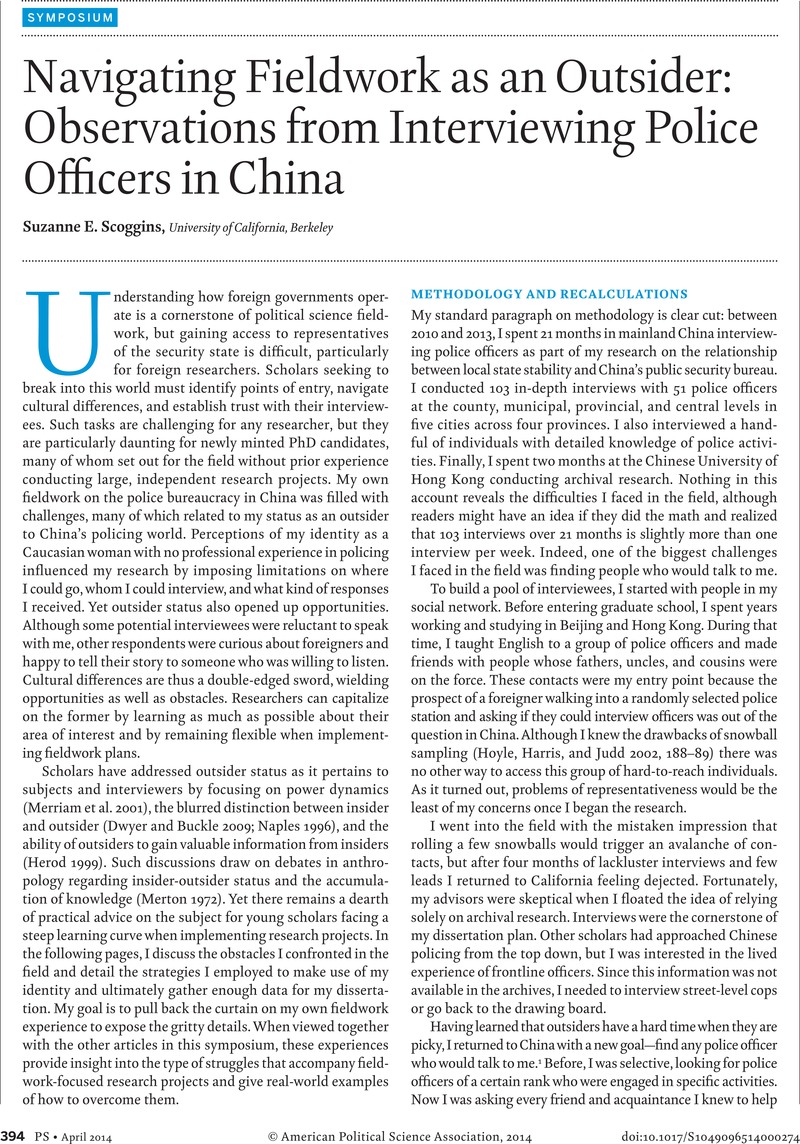Crossref Citations
This article has been cited by the following publications. This list is generated based on data provided by Crossref.
Fung, Courtney J.
2016.
What explains China's deployment to UN peacekeeping operations?.
International Relations of the Asia-Pacific,
Vol. 16,
Issue. 3,
p.
409.
Chestnut Greitens, Sheena
and
Truex, Rory
2018.
Repressive Experiences among China Scholars: New Evidence from Survey Data.
SSRN Electronic Journal ,
Marzo, Pietro
2020.
La dimension internationale de la transition démocratique en Tunisie. Défis méthodologiques d’une recherche qualitative.
Recherches qualitatives,
Vol. 39,
Issue. 1,
p.
42.
Scoggins, Suzanne E.
2021.
Propaganda and the Police: The Softer Side of State Control in China.
Europe-Asia Studies,
Vol. 73,
Issue. 1,
p.
200.
Watson, Danielle
Boateng, Francis D.
and
Miles-Johnson, Toby
2021.
Legitimizing policing practices: a study of stakeholder perceptions of police trustworthiness, effectiveness and relationship with the community.
Police Practice and Research,
Vol. 22,
Issue. 1,
p.
623.
Deodhar, Bhakti
2022.
Inside, Outside, Upside Down: Power, Positionality, and Limits of Ethnic Identity in the Ethnographies of the Far-Right.
Journal of Contemporary Ethnography,
Vol. 51,
Issue. 4,
p.
538.
Li, Lantian
2022.
How to tackle variations in elite interviews: Access, strategies, and power dynamics.
Qualitative Research,
Vol. 22,
Issue. 6,
p.
846.
Wei, Shuai
Jiang, Anli
Hu, Qipu
Liang, Bin
and
Xu, Jianhua
2023.
Conducting criminological fieldwork in China: A comprehensive review and reflection on power relations in the field.
Criminology & Criminal Justice,
p.
174889582311665.
Liu, Lu
and
Chen, Li
2023.
Demystifying China’s police tactical units.
International Journal of Law, Crime and Justice,
Vol. 73,
Issue. ,
p.
100595.
Yu, Suyang
2024.
“Although Burdened, Do We Need to Do More?” Street-Level Bureaucrats’ Organizational Citizenship Behaviors in Poverty Alleviation Policy Implementation.
Administration & Society,
Vol. 56,
Issue. 9-10,
p.
1212.
Marzo, Pietro
2024.
Retours méthodologiques sur la recherche à distance entre Covid-19 et conflits nationaux au Moyen-Orient et en Afrique du Nord.
Études internationales,
Vol. 54,
Issue. 3,
p.
469.



